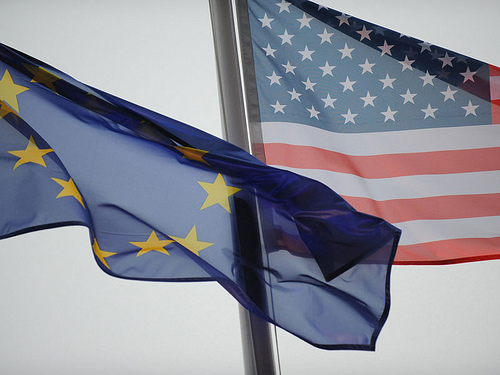
The battle to replace Dominique Strauss-Kahn begins in earnest, as Asia looks to wrestle control from a Europe keen on keeping the IMF focused on the Euro debt crisis. Greece continues to struggle, Portugal receives a stipend until the IMF and EU finance minsters can assess the post-election picture, and Irish commentators call for the country to break from the bailout.
Headlines:
Europe and Asia Set for Battle over Top IMF Post (Spiegel)
The sex charges against Dominique Strauss-Kahn have triggered a search for his successor as head of the IMF. Europe, mindful of the fund’s role in the debt crisis, wants to keep the system of having a European at the helm. But emerging economies say it’s time for a change, heralding a dispute over the succession.
Long Wait Rattles Nerves in Moscow (Spiegel)
President Dmitry Medvedev and Prime Minister Vladimir Putin are confusing friends and foes alike with their determined silence on which of them intends to stand as presidential candidate in the 2012 Russian election. Lawmakers, civil servants and business leaders are tearing their hair out over the political limbo.
Sell, Sell, Sell (The Economist)
“Sell your islands, you bankrupt Greeks – and the Acropolis too!” Such was the furious headline of Bild, Germany’s leading tabloid, when the dire state of Greece’s finances was first revealed. At the time this sounded like a bit of crass populism. But one year on, it has pretty much become the message of Europe’s finance ministers.
Unions urge ministers to ease pressure on Greece (Euractiv)
Meeting in Athens, trade union leaders from across Europe have called on EU finance ministers to show solidarity towards Greece and other EU countries facing serious financial difficulties, notably by reducing interest rates on loans from the European Central Bank (ECB).
Portugal to receive €18 billion until elections (i)
"Help to Portugal approved", headlines i, one day after the euro zone finance ministers approved a €78 billion euro bailout to Portugal, with an average interest rate of 5%. Until the 5 June elections, however, the country will receive 18 billion euros only, the minimum necessary for Portugal to take care of its “financial obligations”, the Lisbon daily notes, adding that Brussels and the IMF wish to see the future government’s programme before they decide whether to release more money. IMF – responsible for a third of the bailout, 26 billion euros – gathers Friday, May 20, to green-light the Portugal aid program. The remaining two-thirds will be shared by the European Financial Stability Facility and the European Financial Stabilisation Mechanism. Germany (15.5%), France (11.7%) and Italy (10.2%) combined account for most of the EU’s support. Finland’s "Yes" to the bailout was established, i adds, on condition that Lisbon "encourages" institutional holders of Portuguese debt to keep it during the validity of the external help program (until 2013) – as a way to guarantee a faster return to the markets. (Full Text in Portuguese)
Has the euro been worth it? (Presseurop)
Adopted just before the financial crisis hit, the single currency is still seen as the recipe for prosperity by most Slovaks. But many economists are beginning to wonder if Bratislava made the right choice.
Special Report: European Business Summit to highlight skills shortage (Euractiv)
Europe risks being left behind by its global competitors as a shortage of engineers and scientists feed into lower productivity and a loss of domestic and international trade, delegates at this year’s European Business Summit will hear.
Helmut Kohl’s Message to Merkel and Europe (Spiegel)
"Follow Helmut Kohl’s lead!" That motto, ex-US President Bill Clinton insisted at an award ceremony for the former German chancellor on Monday night, served him well when he was in the White House. Kohl himself hoped Chancellor Merkel was listening.
Germany Limits Information Exchange with US Intelligence (Spiegel )
Angela Merkel’s government has come under pressure following the deaths of German Islamists in Waziristan through American drone strikes. Berlin has responded by restricting the type of information that German intelligence agencies may pass on to their US counterparts.
UK ‘must invest in amphibious forces’ (Defence Management)
The UK should avoid ‘scepticism’ and invest in amphibious forces to adapt to unpredictable future threats, the Commandant General Royal Marines has said. Major General Buster Howes, in a speech at the Royal United Services Institute, said: "We can’t just value and retain the capabilities of the moment, and for the crisis that we’re in – we must carefully invest in contingency forces and try to insure against ‘alternative futures’ and Rumsfeld’s ‘Unknown Unknowns’."
EDITORIALS AND COLUMNS:
Orientophobia: What we feel (The Economist)
I have just been at the Lennart Meri Conference in Tallinn which I feel sets the standard for security shindigs (see here for the agenda), and not only because the organisers let me chair two sessions (disclosure: they paid my flight and hotel). The theme was "Making Values Count".
Ireland’s future depends on breaking free from bailout(Irish Times)
Ireland is heading for bankruptcy, which would be catastrophic for a country that trades on its reputation as a safe place to do business, writes MORGAN KELLY. With the Irish Government on track to owe a quarter of a trillion euro by 2014, a prolonged and chaotic national bankruptcy is becoming inevitable. By the time the dust settles, Ireland’s last remaining asset, its reputation as a safe place from which to conduct business, will have been destroyed.
Image: transatlantic.jpg
